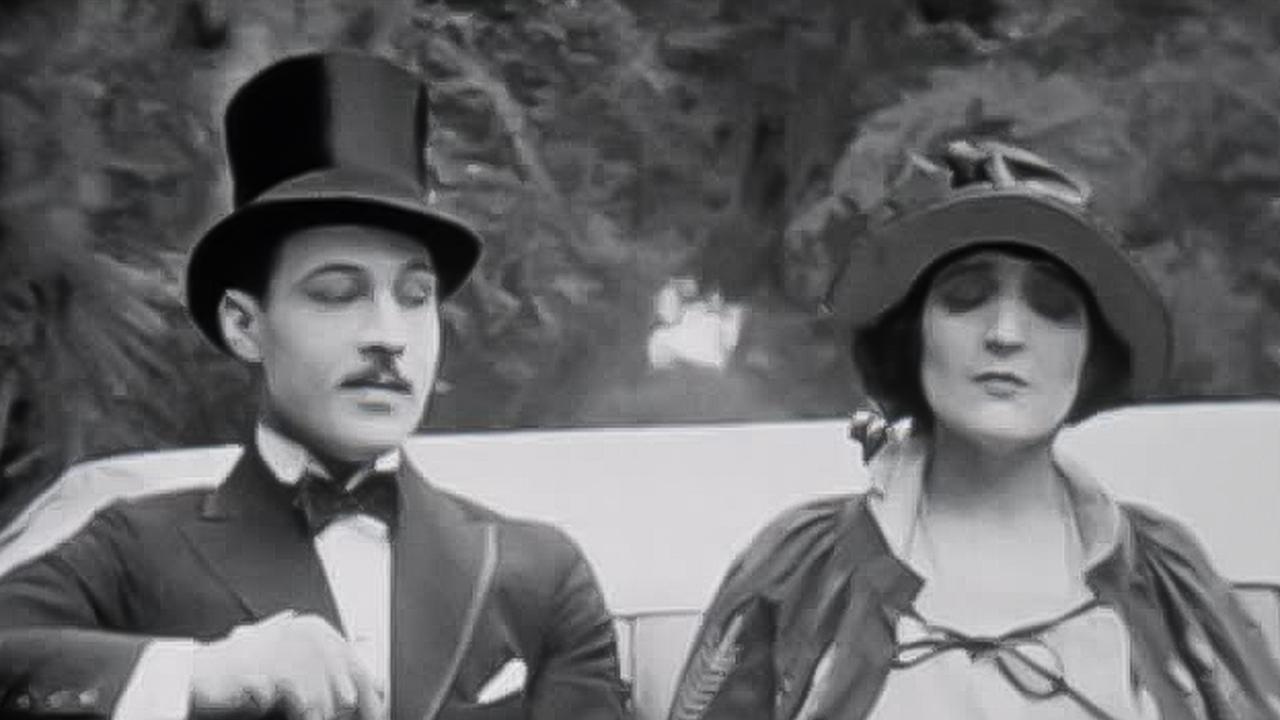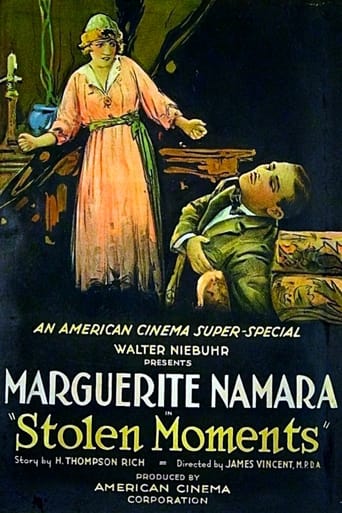Konterr
Brilliant and touching
KnotStronger
This is a must-see and one of the best documentaries - and films - of this year.
Bessie Smyth
Great story, amazing characters, superb action, enthralling cinematography. Yes, this is something I am glad I spent money on.
Kirandeep Yoder
The joyful confection is coated in a sparkly gloss, bright enough to gleam from the darkest, most cynical corners.
Michael_Elliott
Stolen Moments (1920) ** (out of 4) A rather dull and lifeless silent melodrama about a woman (Marguerite Namara) torn between a Latin playboy (Rudolph Valentino) and a hardworking man (Albert L. Barrett). This was originally produced to show off Namara and was released as a six-reeler but after Valentino became a star the studio went back and cut most of the story out making this a three-reeler that showed off the famous star more. With that in mind, it's really no shock that the film makes very little sense and this is certainly true during the final act, which involves a murder and an investigation. The six-reel version is now lost so this "Valentino version" is all that's left. Once again, I can't say I was too impressed with the silent icon but I do plan on getting to some of his more famous roles. Namara isn't any better in the lead but Barrett comes across with a good performance and is the main reason to see this.
MartinHafer
This was originally a six-reel film starring Marguerite Namara. However, after supporting actor Valentino became an international star, the sleazy owners of this picture re-edited it (slashing it down to three reels) and billed it as a "Valentino picture". Unfortunately, the original version no longer exists, so this review is based on the truncated version.The film seems like a very, very old fashioned morality play--and not a very good one at that. Marguerite is a nice lady who has fallen for Brazilian author Valentino. They write a few letters (that seem rather innocuous and innocent) and plan on running off together. Only at the last minute does she find out he has no intention of marrying her--he just wants to shack up! She ditches him and he continues his carnal lifestyle.Years later, Marguerite and Valentino meet. She's married and has a child and Valentino is still a pervert. He suggests they have an affair and she is justifiably horrified. Then he reminds her he has letters she'd written him in the past pledging her undying love in order to try to blackmail her into having sex with him! Why she didn't just tell her husband about the innocent letters and walk away, I have no idea--this is a HUGE plot problem with the film. Instead, she sneaks in to Valentino's home to steal the letters but is confronted by him. He tries to rape her and she stabs him with a nearby knife and takes the letters. The next day, she hears that he is indeed dead and the police investigate. Eventually, it turns out ANOTHER person came in after Marguerite stabbed him superficially and finished the job--apparently Valentino had dishonored the man's sister and he wanted revenge! If the plot seems silly and contrived, it is. And, it's not an especially memorable film.PS--If you care, this was one of the only films I have heard that was filmed in St. Augustine, Florida.
blanche-2
Restored at UCLA, "Stolen Moments" is an 85-year-old film featuring Rudolph Valentino in one of the villainous roles he played before stardom hit. Here, he has a mustache and looks a bit fuller in the face as he plays a smooth, oily, amoral writer who wants to trade sex for some passionate letters he received from a now married woman (Marguerite Namara).Not much of this movie remains. When Valentino became a star, the film was recut to enhance his role, as it originally was a showcase for Namara, an opera singer. All that remained after that was the re-cut version, and it has not survived in its entirety. What does remain is in remarkable shape.Valentino is very good, and although some of the old silent film acting like the widening of the eyes is disconcerting, it's certainly forgivable. We're fortunate to be able to see him this early in his career. I will reiterate something I said about other films of this era: I don't know how much Lasik surgery one has to have before being able to read all the notes that were received by characters in these silent films. It's obvious that '20s eyes were a lot sharper.
boblipton
This was Valentino's last film before he appeared in Rex Ingram's THE FOUR HORSEMEN OF THE APOCALYPSE, the film that made him a star -- so great a star that the original six reels of this movie were cut down to three and edited to make his role more important.It's a fairly old-fashioned movie for 1920: a still camera, mostly one- and two-shots and the frame is frequently irised in to provide a specific composition, a technique that Hollywood had largely abandoned by this time, preferring to let the objects and people provide their own compositions. The story is also old-fashioned and the entire thing was done to showcase the female lead, Margeurite Namara. Who was she? Someone who was a show-biz celebrity at the time. Really, the only talent connected with this picture whose name has survived well is Valentino and perhaps Gene Gauthier.Although his next picture would make him a star, Valentino is clearly a very talented motion picture actor by this time. He understands how to pace his movements and how to indicate his character -- and even his nationality -- by how he moves. Here he is clearly European. In the previous year's DELICIOUS LITTLE DEVIL, no one could have acted more American. Here was a man who earned his stardom. Take a look at this and other performances and see it.

